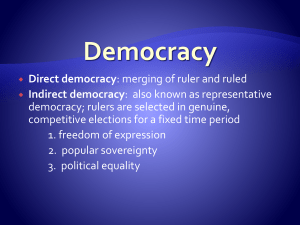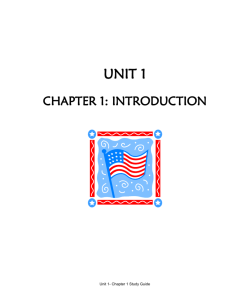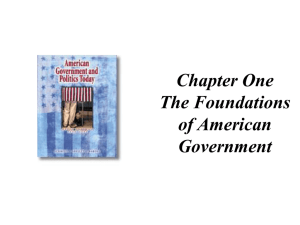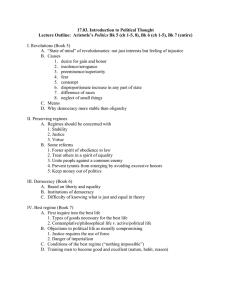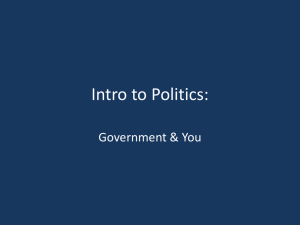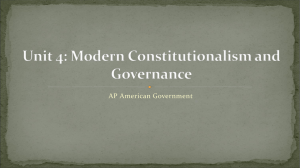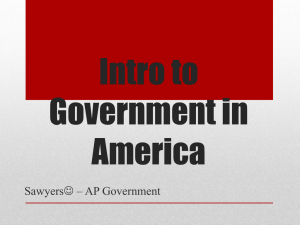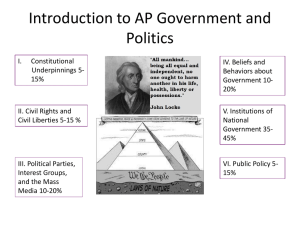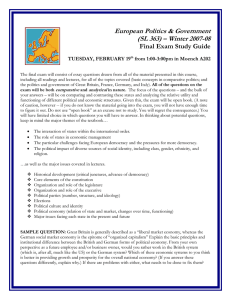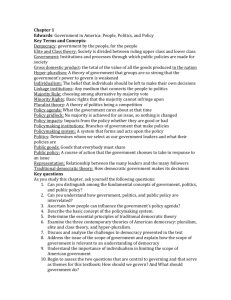Theories of Democratic Government #2
advertisement
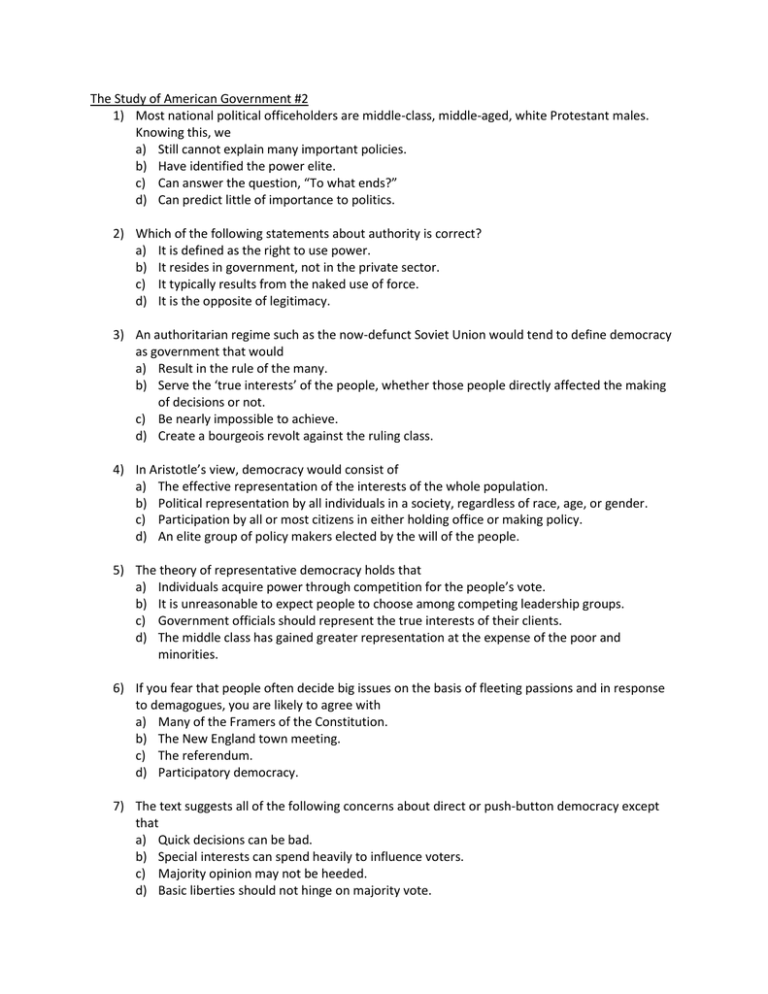
The Study of American Government #2 1) Most national political officeholders are middle-class, middle-aged, white Protestant males. Knowing this, we a) Still cannot explain many important policies. b) Have identified the power elite. c) Can answer the question, “To what ends?” d) Can predict little of importance to politics. 2) Which of the following statements about authority is correct? a) It is defined as the right to use power. b) It resides in government, not in the private sector. c) It typically results from the naked use of force. d) It is the opposite of legitimacy. 3) An authoritarian regime such as the now-defunct Soviet Union would tend to define democracy as government that would a) Result in the rule of the many. b) Serve the ‘true interests’ of the people, whether those people directly affected the making of decisions or not. c) Be nearly impossible to achieve. d) Create a bourgeois revolt against the ruling class. 4) In Aristotle’s view, democracy would consist of a) The effective representation of the interests of the whole population. b) Political representation by all individuals in a society, regardless of race, age, or gender. c) Participation by all or most citizens in either holding office or making policy. d) An elite group of policy makers elected by the will of the people. 5) The theory of representative democracy holds that a) Individuals acquire power through competition for the people’s vote. b) It is unreasonable to expect people to choose among competing leadership groups. c) Government officials should represent the true interests of their clients. d) The middle class has gained greater representation at the expense of the poor and minorities. 6) If you fear that people often decide big issues on the basis of fleeting passions and in response to demagogues, you are likely to agree with a) Many of the Framers of the Constitution. b) The New England town meeting. c) The referendum. d) Participatory democracy. 7) The text suggests all of the following concerns about direct or push-button democracy except that a) Quick decisions can be bad. b) Special interests can spend heavily to influence voters. c) Majority opinion may not be heeded. d) Basic liberties should not hinge on majority vote. 8) In the Marxist view government is a reflection of underlying ________________ forces. a) Social b) Political c) Ideological d) Economic 9) C. Wright Mills, an American sociologist, is best known for his work dealing with a) The tyranny of the majority. b) Pork barrel legislation. c) The power elite. d) Neo-Marxist policy. 10) Max Weber felt that the dominant social and political fact of modern times was a) That ‘the Establishment’ was dominated by Wall Street lawyers. b) That all institutions have fallen under the control of large bureaucracies. c) That capitalism is essential to modern-day forms of government. d) The conflict between the government and the press. 11) The view that money, expertise, prestige, and so forth are widely scattered throughout our society in the hands of a variety of groups is known as the a) Pluralist view of American society. b) Economic theory of democracy. c) Elitist view of American society. d) Dispersed power theory of American politics. 12) One reason the text makes frequent reference to American history is that a) What government does today is affected by what it did yesterday. b) American political institutions have existed largely without change since the eighteenth century. c) Today’s policies are largely the same as those that existed two hundred years ago. d) The policies and institutions of yesterday differ enormously from those of today. 13) Ronald Reagan’s policy initiatives on social and economic problems sought to a) Return citizens’ assumptions to what they had been during World War II. b) Return citizens’ assumptions to what they had been before the 1930s. c) Broaden government’s social net for the truly needy. d) Move the United States into the front rank of nations involved in forward social planning. 14) American foreign policy, according to the text, tends to alternate between a) Cold wars and hot wars. b) Idealism and realism. c) Bipolarism and multilateralism. d) Interventions and isolationism. 15) The kinds of answers that political scientists usually give to the fundamental political questions tend to be a) Highly abstract and speculative. b) Clear, concrete, and consistent. c) Partial, contingent, and controversial. d) Qualified to the point of unintelligibility. 16) In the late 1970s may employees of the Civil Aeronautics Board worked hard to have their agency a) Expanded. b) Deregulated. c) Abolished. d) Reformed. 17) The fact that people have been willing to die over competing definitions of political issues suggests that a) Ways of thinking about political issues can be of fundamental importance. b) Politics concerns who gets what, when, where, and how. c) Delusions are central to the political process. d) Human nature is fundamentally inconsistent. 18) Power deals with relationships that are typically a) Coercive. b) Based on natural law. c) Competitive. d) Difficult to quantify. 19) According to the text, before making judgments about institutions and interests, we must first observe them a) From a disinterested vantage point. b) As manifestations of underlying economic relationships. c) Firsthand. d) On a variety of different issues. 20) The logical place to begin the study of how power is distributed in U.S. politics is a) The Constitutional Convention. b) Your local town hall or courthouse. c) The day-to-day lives of Americans. d) The pages of this morning’s newspaper. ANSWERS 1) 2) 3) 4) 5) 6) 7) 8) 9) 10) 11) 12) 13) 14) 15) 16) 17) 18) 19) 20) A A B C A A C D C B A A B D C C A D D A

